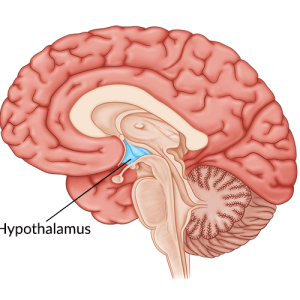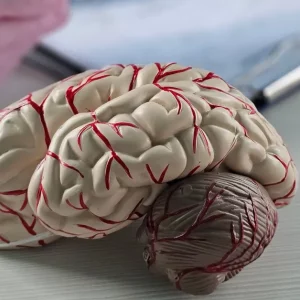Can taking the medication Ritalin for brain injury help overcome cognitive impairments after TBI? Today’s article explains how Ritalin can impact brain injury recovery and which cognitive impairments it is best suited to overcome.
Hopefully, information from this article will facilitate fruitful discussions with your doctor about Ritalin for brain injury.
How Ritalin Works
Ritalin, also known as methylphenidate, is a drug that enhances neurotransmitter activity in the brain. Neurotransmitters are chemical messengers that allow neurons to communicate with each other.
More neurotransmitters available to brain cells, means more opportunities for signal transmission between cells. This can have the effect of improved overall brain function.
Ritalin blocks the reuptake of dopamine and norepinephrine, two neurotransmitters that boost mood and concentration. By boosting the amount of dopamine and norepinephrine, Ritalin can enhance brain functioning.
Ritalin is primarily used to manage symptoms in patients with ADHD. However, because brain injury shares several characteristics with ADHD, some doctors prescribe it to their TBI patients as well.
Potential Benefits of Taking Ritalin for Brain Injury
Several animal studies show that traumatic brain injury can cause a significant decrease in dopamine levels. Therefore, it is logical to consider that medications such as Ritalin, which increases the amount of dopamine in the brain, might improve TBI symptoms. Research is ongoing to determine the potential roles of dopamine in TBI and how to treat this deficit.
Below are some potential benefits of Ritalin for brain injury patients:
1. May Improve Cognitive Fatigue
One common symptom of brain injury that may be caused by a dopamine imbalance is cognitive fatigue. While we do not know the exact mechanism of cognitive fatigue, doctors do know that the brain processes information less efficiently after a traumatic brain injury.
For example, in a study that compared brain activity of both healthy patients and TBI patients, the TBI survivors used more brain regions to complete a mental task than the non-injured group did.
When treated with Ritalin, however, brain injury patients displayed lower mental fatigue and shorter reaction time. In other words, Ritalin seemed to help them make more efficient use of their brain’s resources.
2. May Help Working Memory
Another common cognitive effect of brain injury is impaired short-term or working memory. This type of memory refers to a person’s ability to remember what happened within the last 30-40 seconds.
While that doesn’t sound long, it is why most people can:
- Understand sentences, both written and spoken.
- Remember short sequences of numbers, like telephone numbers.
- Remember what’s on their grocery list.
In short, working memory allows you to learn new skills and interact meaningfully with the world.
Brain injury can hamper this skill, but research studies have begun to show that Ritalin may enhance working memory.
For example, in one double-blind, placebo-controlled study, scientists compared the memory skills of 15 severe TBI patients to 15 healthy patients. As the researchers expected, the healthy patients significantly outperformed the TBI patients given a placebo drug. But when the TBI patients used 30 mg of methylphenidate (Ritalin), their working memory performed at the same level as those without a brain injury. This indicates that Ritalin may improve memory skills.
3. May Help Boost Motivation
Finally, Ritalin may boost motivation in brain injury patients. Lack of motivation usually occurs after a frontal lobe injury. Low dopamine levels also correlate with low motivation.
Therefore, people with decreased dopamine levels will have a more difficult time finding the motivation to begin or complete an activity. There are a variety of ways to boost dopamine levels in your brain. Some individuals with brain injury may find Ritalin helpful to increase motivation and enhance their initiative.
In fact, according to researchers from Brown University, Ritalin enables individuals to focus on the benefits of work, not the cost. This has huge implications for TBI survivors because Ritalin may motivate them to continue with their therapy at home, something many patients struggle with when results are slow to come
How to Use Ritalin for Brain Injury
Now that you understand some of the benefits of Ritalin for brain injury, let’s discuss the best way to use it. All these benefits of Ritalin can make it sound like a magic pill for brain injury. And, for many patients, it has potential to have a positive impact on their recovery.
However, this is achieved when it is taken in combination with the work and practice of the skills you are hoping to obtain. Ritalin may lessen the severity of your cognitive deficits and improve your mood, but you will need to put in effort to develop your skills.
This is because the only way to truly recover from a brain injury is to maximize the effects of neuroplasticity. Your brain needs to reorganize itself to recover function. Studies show that Ritalin is more effective when combined with cognitive therapy than when used on its own.
To activate neuroplasticity, you must practice the skills you are hoping to obtain. The more practice, the more your brain will strengthen its neural pathways.
For example, to improve your memory skills, therapists recommend you practice cognitive rehab exercises every day.
Therefore, use Ritalin as an aid to enhance the skills you are implementing for your recovery. It does not do you much good without reinforcement of skills
Side Effects of Ritalin
While Ritalin offers many potential benefits for brain injury patients, it can also trigger some serious side effects. This is why it may not be a good option for you.
The most common side effects of Ritalin include:
- Increased heart rate and blood pressure
- Insomnia
- Anxiety
- Agitation
- Headaches
- Nausea
- Loss of appetite
In addition, for patients with normal dopamine levels, Ritalin can cause an excess of dopamine. This can lead to psychotic symptoms such as hallucinations, as well as aggression and euphoria.
Fortunately, Ritalin is a fast-acting drug, which means it does not stay in the body long. Therefore, if you do experience these symptoms, stopping the drug will eliminate its side effects.
Patients can also develop a tolerance for Ritalin after chronic use. That is why doctors recommend only using Ritalin for a limited time, usually at the beginning of recovery.
Ritalin for Brain Injury: Is It Right for You?
When a brain injury impairs a person’s concentration, mood, or memory, doctors may recommend Ritalin. Ritalin increases the amount of dopamine and other chemicals available to the brain which can boost cognitive function. However, it is not a permanent solution.
While Ritalin can clear your mind and motivate you, only consistent therapy is the sure way to reverse the cognitive effects of brain injury. With enough repetition, your cognitive skills should improve enough that you can participate in the activities that once were a struggle.










